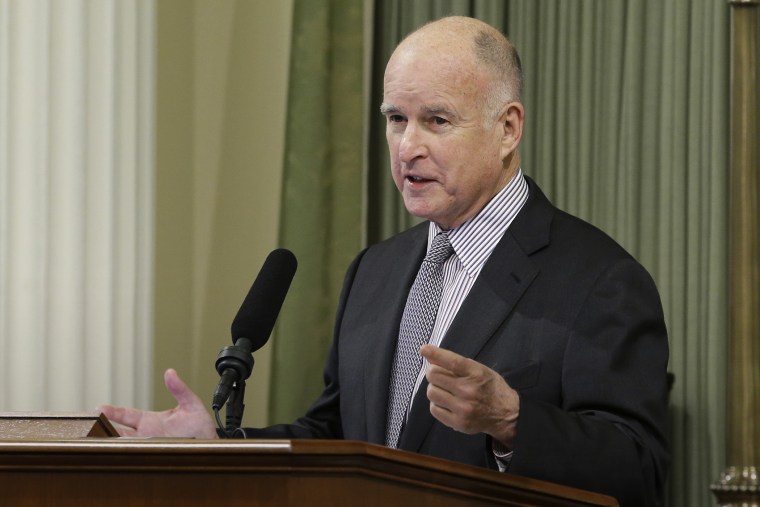In by far the biggest victory yet for the movement to boost pay for low-wage workers, California Gov. Jerry Brown and legislative and labor leaders announced a deal Monday to raise the state’s minimum wage to $15 an hour by 2022.
"In the wealthiest state in the wealthiest nation on earth, no one who works full time should be forced to live in poverty," said Kevin de Leon, the president pro tempore of the state Senate, at a press conference to unveil the agreement. "It's time to restore to California the American dream for working families."
More than 5.6 million struggling Californians representing over 32 percent of the state’s workforce are expected to get a raise through the deal, which could be voted on as early as next week. It comes as New York state leaders are negotiating a potential raise to $15 an hour there, too. Getting to that mark in the nation’s largest and third largest states would represent stunning progress for a labor-backed campaign that launched less than four years ago.
There are likely advances elsewhere, too. The District of Columbia's mayor last week released a plan to go to $15 an hour by 2020, and New Jerseyans may be able to vote next year on enshrining $15 an hour into their state’s constitution.
The fight to raise the minimum wage, spearheaded by the Service Employees International Union and with young and minority low-wage workers at the forefront, has played a prominent role in the Democratic presidential race, too. Bernie Sanders, whose campaign has centered on reducing income inequality, has endorsed a $15 minimum. Hillary Clinton has backed a $12 national minimum and has expressed support for some state- and city-level efforts to go to $15.
Under the plan announced by Brown, California’s minimum wage, currently $10 an hour, would rise to $10.50 on January 1, 2017. From there, it would go up year by year to $15 by 2022. Businesses with fewer than 25 employees would have until 2023 to get to $15. California has already been a stronghold for the campaign, as Los Angeles, Los Angeles County, San Francisco, Oakland and San Diego all have already set a $15 wage in recent years.
Anggie Godoy, 20, a cashier at a Los Angeles McDonald’s who is active with the campaign, said an eventual raise to $15 an hour would allow her to bring in more income to help support her family. And it might one day allow her to live on her own, as she’d like.
“I’m killing myself just to survive,” said Godoy, who currently makes $10 an hour, the Los Angeles minimum. “It shouldn’t be that way. I should be able to have time for myself and be able to sustain my family without worrying that I won’t have enough for another bill.”
Most studies suggest that modest minimum wage boosts have little to no negative effect on employment. Still, even some economists who support a higher minimum wage have expressed concern that $15 an hour is uncharted territory. Brown, too, recently warned that raising the wage too high could hurt the state economically. But California’s gradual approach, which allows for flexibility in the event of an economic downturn, is expected to help reduce any negative impact. Fifteen dollars in 2022 is about $13.30 in today’s dollars, assuming a relatively stable inflation rate.
In addition, the deal emerged as a compromise position. Last week, a labor-backed initiative that would have raised the wage to $15 more quickly qualified for the state ballot, setting up a costly political campaign this fall. Labor leaders are expected to withdraw the measure from the ballot once the law is signed.
Advocates for low-wage workers, meanwhile, are vowing to continue the fight.
“The victory in California shows us that we need to keep on marching, keep on speaking out and keep on sticking together until we win $15 everywhere,” Terrence Wise, a McDonald’s and Burger King worker in Kansas City and a leader of the campaign, said in a statement. “If you work hard, you shouldn’t have to rely on the government to support your family—you should be paid enough to put a roof over your kids’ heads and food on their table.”
